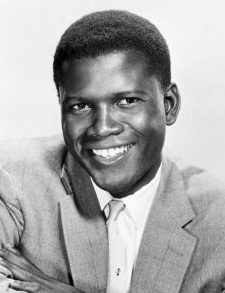A Hero Through Film
Early Life
Sidney Poitier was born on February 20, 1927, and raised between Cat Island and the Bahamas. After moving to Miami, he worked on a farm and sold produce to support his family. He grew up without electricity and other modern conveniences. Poitier was not fond of his time in Miami.
“I didn’t run into racism until we moved to Nassau when I was ten and a half, but it was vastly different from the kind of horrendous oppression that black people in Miami were under when I moved there at 15. I found Florida an anti human place.” – Poitier
Career
Later in life, he relocated to New York City and then joined the Army in 1945. After spending two years in the Army he decided to audition for a theater production specifically written for African Americans. After his first audition he was rejected. He worked on the craft of acting as he worked at the theater in exchange for lessons. Eventually, he was accepted after a second audition. Poitier realized during this time that he carried a very heavy Bahamian accent which he would need to reduce somehow.
Days of Our Youth was his official debut in Broadway’s Lysistrata. He took the role after an actor couldn’t perform. Poitier also played a role in Anna Lucasta and toured the country for the theater which led to him becoming a notable actor and roles in several films. The experience of being a black actor in the Fifties was not lost on Poitier.
“I was the only Black person on the set. It was unusual for me to be in a circumstance in which every move I made was tantamount to representation of 18 million people” (Poitier).
He started his acting career in the 1950 film, No Way Out, a movie about racial injustice in the workforce. Poitier’s character faces backlash after trying to save a white patient’s life, who dies on the operating table, and is accused of murder by the patient’s brother. “I was fortunate enough to have been raised to a certain point before I got into the race thing. I had other views of what a human is, so I was never able to see racism as the big question. Racism was horrendous, but there were other aspects to life,” Poitier said in an interview with Oprah.

In 1963 Poitier made history by winning the Academy Award for Best Actor in a Leading Role for Lilies of the Field, and won a Global Globe award for the same film. In the 1970s Poitier went from acting in other people’s films to directing and acting in his own creations.
“The impact of the black audience is expressing itself. They look to films to be more expressive of their needs, their lives. Hollywood has gotten that message – finally.” (Poitier).
Poitier was knighted in 1974 by Queen Elizabeth II for bridging racial and cultural divides, a major achievement for the time period. In 1995 he received the Kennedy Center Honor, an award for those who contributed to American culture through the performing arts. In 2009 he was awarded the Presidential Medal of Freedom, this award is given to those who have made exceptional contributions to the United States, and or the world.

Sidney Poitier lived a long life with a career spanning 57 years In that time period he acted and directed 48 films. He won recognition for his work, including an Academy Award, a Grammy and two Golden Globe awards. He passed away with his family by his side on January 6, 2022 in the Bahamas with his family, He was ninety-four years old.
Sources - https://www.blackpast.org/african-american-history/poitier-sidney-1927/ https://www.biography.com/actors/sidney-poitier https://www.oprah.com/omagazine/oprah-interviews-sidney-poitier/all Photo source - https://achievement.org/achiever/sidney-poitier/ https://www.imdb.com/title/tt0042792/






